Some never stray from the pack, ditch the tour, break the rules, and it saddens me. When crap hits the fan, travel is best. The unpredictable, the unexpected, that’s the magic of travel.
Everything gone wrong often leads to everything going right. Up is down, down is up, and all those other glorious contradictions of terms.
But when travel goes right, guess what? That’s right! It’s still awesome! HUZZAH!
Travel is a whirlwind of perspective meet actuality, plan meet fate. A kaleidoscope of humanity and culture. Food, booze, atmosphere, color, chaos, unpredictability. It’s life as a drunken soup that simmers for the long haul.
When I come home, that magic vanishes.
That, too, is a blessing. It’s why we keep the old battered sweater and the broken-down jeans. Knowing what we’re in for often feels like that storied warm hug everyone needs from time to time. Coming home, for me, I know it’s a place where I feel safe and confident. I’m connected with every inch of the city, I’ve been to all the hoods, you know? I drive through town and it’s a panorama of my life’s timeline. That’s cool.
But I’ve had that all my life.
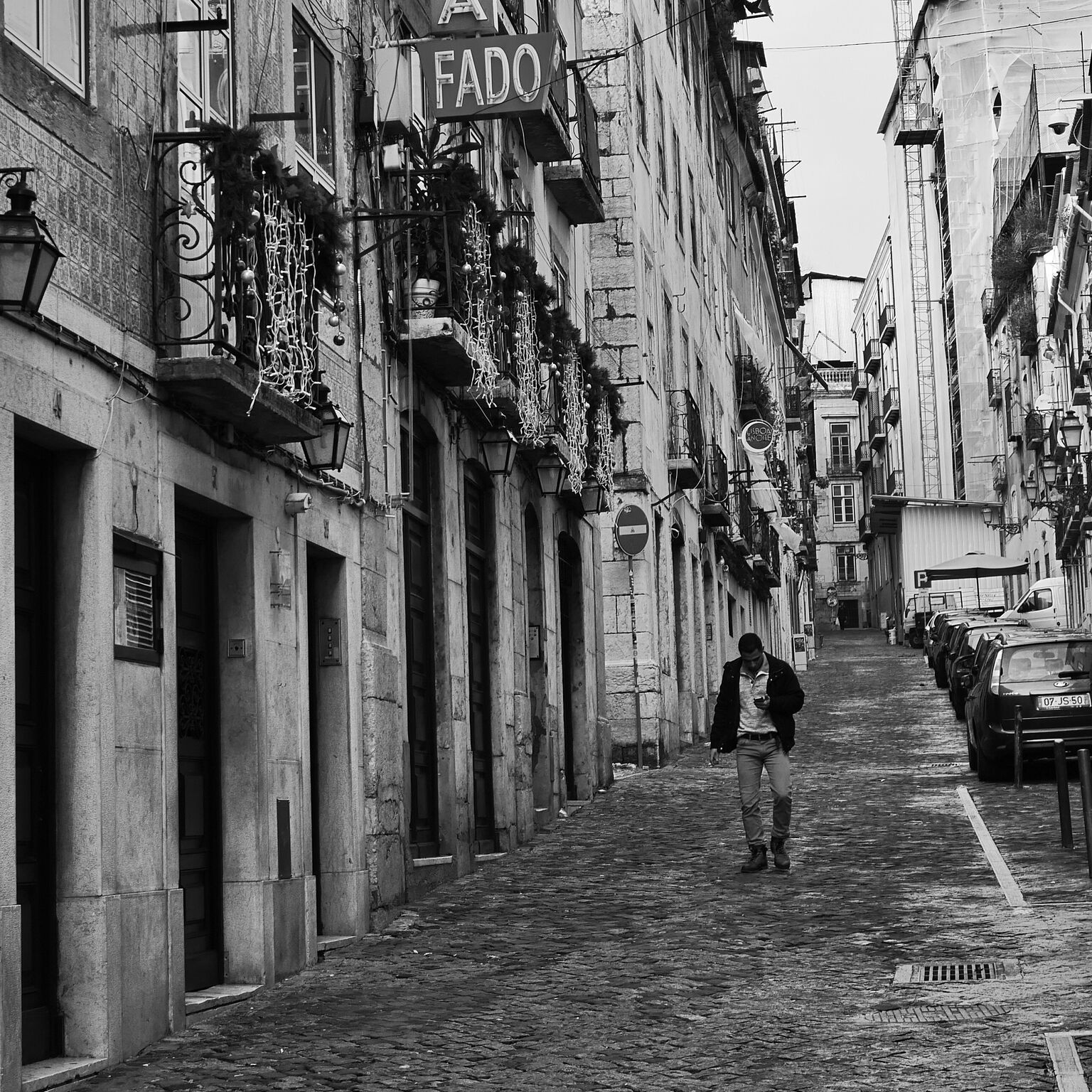
Man strolls in the Bairo Alto of Lisbon, the fado singing district packed with great restaurants featuring traditional dishes.
The Joys of a Lost Plot
Home is comfortable, it’s safe. For me, I now realize safety is complacency in my life. I need curiosity and the unknown to keep me active and alive. Things Going Sideways terrified me before I left, but the more I travel, the more I realize that’s where the unexpected magic happens.
Every time things go sideways on my journeys, it’s in a crazy way that is almost as enjoyable as anything else that happens. I mean, Air France losing my luggage between Paris and Lisbon gave me an amazing 6 hours in a small corner of Lisbon that was nothing like anything else I experienced in the city. It was a wonderful day filled with a pastry-maker who fed me and struggled to explain all the culture of the pastries. At a traditional bodega, I had stewed beans and a jar of wine. No one spoke English. Even getting my cell phone resolved there was fun. Who knew getting your luggage lost for 12 hours could work out so well?
I can honestly say that, yeah, I have a lot of struggles and things going badly as I travel. I’d still say the only thing that stung and failed to teach me anything I didn’t already know was having $430 stolen by a Mexican ATM. That still sucks and hasn’t been resolved, nearly 3.5 months later. It’s a drag. Shit happens, right?
Lesson re-learned. Never visit kiosk ATMs. Always ensure it’s in business hours and an ATM attached to a multinational bank.
Soon, I’ll be back in Europe. I can’t wait to be around that history and the varied architecture. Mexico’s architecture was too monotonous for me. And here, well, it’s too discordant. I like the grand European cities of modernism clashing with history.
There, more people speak English and the chance of me stumbling into adventure again is much higher. I’m stoked to have that opportunity again.
A Day Packed with the Magic of Travel
One of the best days of my entire year wasn’t a day where everything went sideways, just a day with no plans other than taking a walk.
I was in Lisbon, Portugal, when my AirBNB host told me his building dated to 1760ish, and was part of Lisbon’s reconstruction. This was the first I learned of its 1755 earthquake. Lisbon was demolished by one of the most destructive earthquakes in history. 85% of its buildings were destroyed. Its people rushed to the seaside for safety but then a tsunami rolled in and killed 20% of the population, at least; some think half died.
It sent a 65-foot tsunami to North Africa, killing over 10,000 in Morocco alone. The tsunami went 500 feet inland over the Azores Islands, and reached Brazil too, nearly 7,500 kilometres away.
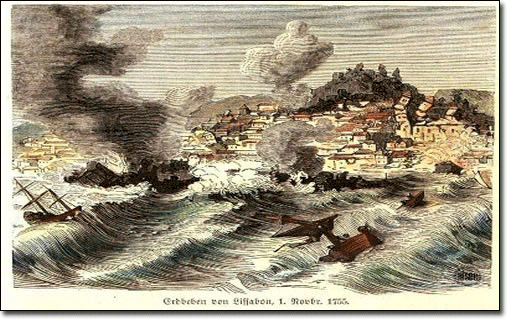
The Lisbon 1755 Earthquake. Public domain.
Prologue: The Great Quake
“At 9:30 in the morning the inhabitants were alarmed by weak tremors. Christian Staqueler, consul of the German city of Hamburg, remembers in a later report: “First we heard a rumble, like the noise of a carriage, it became louder and louder, until it was as loud as the loudest noise of a gun, immediately after that we felt the first tremble.”
At 9:40 all the bells of the city began to ring simultaneously and only seconds later the first buildings collapsed. Three major shakes followed in the next 10 minutes, most people were killed by the collapse of the churches, full of believers attending the second mass of the day,
People fled in the direction of the seaport where the large squares of the royal palace promised shelter from the debris of the collapsing buildings. It was there that they witnessed a strange phenomenon: The sea had vanished and the riverbed of the Tejo was dry. At 10:10 a 12 meter high tsunami-wave reached the city and destroyed the entire harbour, thousands of people standing along the shores were swept away and killed.
After the earthquake and the tsunami a terrible fire broke out; raging for five days it destroyed what earth and water had left over.
In the end three quarters of the city lay in ruins, estimated 30.000 – 60.000 people killed, the earthquake further damaged cities on the coast of Morocco, the tsunami caused havoc in Ireland and the African coast and waves of 4 meters reached the Caribbean islands.”
From Scientific American
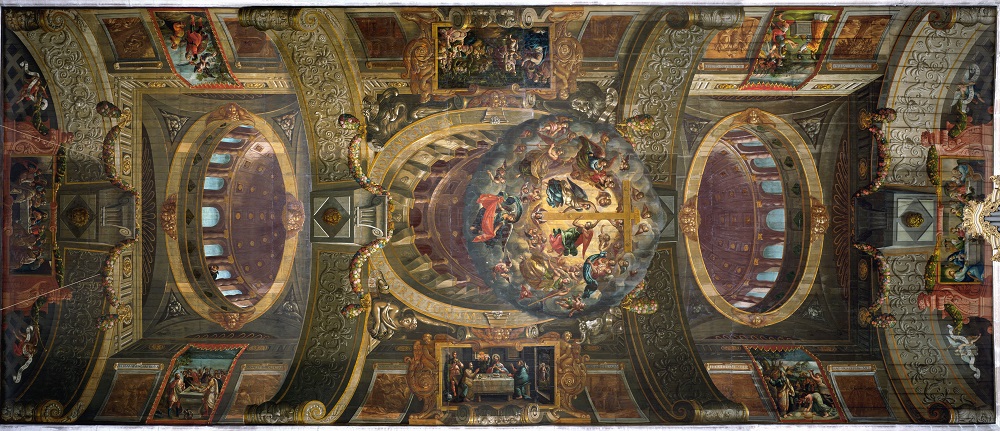
The ceiling mural in the Church of St. Roch or Ingreja de Sao Roque, Lisbon/Lisboa, Portugal.
Knowledge: The Secret to Travel Magic
“At 9:40 all the bells of the city began to ring simultaneously…” Imagine that. I’ve heard staggered bells only once in my travels, and never simultaneous. At that time, live was quiet. No engines, no machines, no traffic. Just the rumbling of carriages and the pounding of mallets and such.
But that whole passage struck me, really. 85% of the city got levelled, and with it more than ¼ of the nation’s wealth. Comprehending such destruction staggered me and gave me a new perspective to begin my day. I walked two blocks to a church I’d meant to visit. Entering floored me. What was this opulent place? I Googled. Igreja de São Roque dated to around 1590, preceding the quake. The first-ever Jesuit church built. A survivor of The Time Before, built during the height of Portugal’s seafaring age of wealth.
The church, Sao Roque, was gobsmacking in its beauty. My first Portuguese church, I hadn’t expected the interior splendor with such a plain exterior. The gilt, the murals, the color, the grandeur… A capital city of wealth and ostentatious beauty was wiped out in 10 minutes.
The immense sadness of the loss from that one catastrophe hit me so hard. Talk to Portuguese people today and you get the sense it was the beginning of all their troubles, that even now, 260 years later, they’re still trying to regroup.
It was as profound emotional resonance as I’ve had anywhere in my travels, even compared to standing alone in a Roman coliseum. Lisbon was very, very emotive.
I stayed awhile, overcome, thinking about how oddly random life can be. Ten minutes can literally wipe out everything you’ve ever known. What a thought. What a way to realize the importance of now.
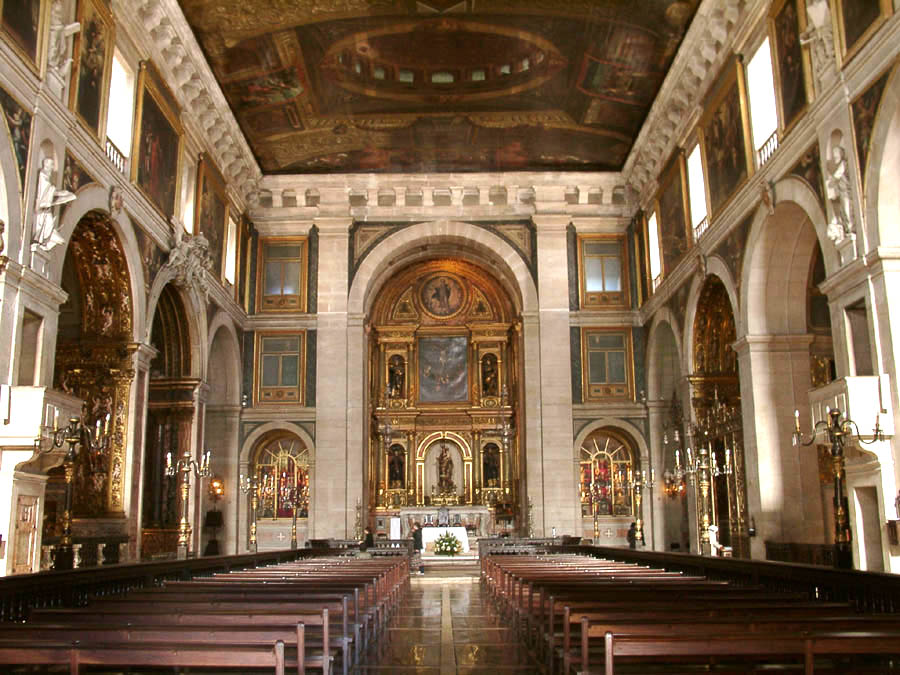
Igreja de Sao Roque. Creative Commons.
A Tale of Destruction
“85% of Lisbon’s buildings were destroyed, including famous palaces and libraries, as well as most examples of Portugal’s distinctive 16th-century Manueline architecture. Several buildings that had suffered little earthquake damage were destroyed by the subsequent fire. The new Lisbon opera house (the “Ópera do Tejo”), opened just six months before, burned to the ground. The Royal Ribeira Palace, which stood just beside the Tagus river in the modern square of Terreiro do Paço, was destroyed by the earthquake and tsunami. Inside, the 70,000-volume royal library as well as hundreds of works of art, including paintings by Titian, Rubens, and Correggio, were lost. The royal archives disappeared together with detailed historical records of explorations by Vasco da Gama and other early navigators. The palace of Henrique de Meneses, 3rd Marquis of Louriçal, which housed an invaluable library of 18,000 books, was also destroyed.”
From Wikipedia
But Time Marches On
My church moment gave me time to think of what I identified with. Loss, waste, rebuilding. On one level or another, many of us relate in some way to rebuilding our lives from the rubble of loss. So, from there, I planned to seek life, resurrection, and overcoming odds.
I departed the church, turned right, and headed up the hill. There, I found a terraced park atop a cliff, overlooking the whole of the city and its harbour. Miradouro de São Pedro de Alcântara was a simple park square, but it’s all about location and view. It was a magically unseasonal December day and just the right time to catch people at their most effervescent. Hard rains had deluged the city the day before, and people embraced the unexpected return of early autumn weather.
It was there I listened to a man playing the sweetest blues on his guitar. I listened to his music, which felt like a swirl of joy and all the pain I’ve ever felt. It was everything the blues should be.
But I wasn’t blue. Only the sky was, thanks to a toasty 22-degree day a week before Christmas. Soaking in the view from that park was great, but the city sprawled below beckoned me to explore. Down some stairs I went, to the hill that the funicular trundled up. There, I ran into two dudes, one from Guinea-Bissau and another from the Netherlands.
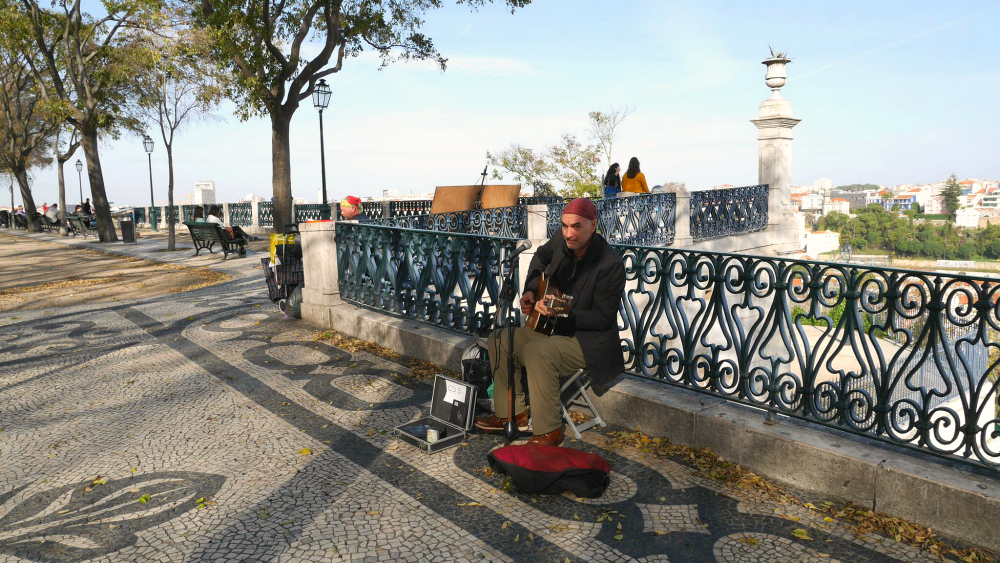
The magic of travel: Blues man in Portugal.
Strangers: The Unexpected Element
The African and Dutchman were graffiti-painting a wall. A tidal wave of color, Dutchie was a prodigal graffiti fiend. He reconnected with tagging while he was travelling and found that Portuguese police don’t care if you do graffiti art. Just do a nice job of it.
We talked awhile, and the African, Z, told me he wanted to be a rapper, so he demonstrated his rhymes. Next thing you know, 30 minutes have passed and I’m still only 75 metres from where I was looking over the cityscape. Z asked where I was headed, I said “around”, and he said he’d buy me a coffee. So we set off.
He talked a lot about why he loved Lisbon. A cool vibe and a big personality, Lisbon’s the guy who’s got everything but doesn’t know it.
We got to Rua de Prata, the incredible pedestrian drag in the centre of town. There, we had coffee on a plaza, and Z took his leave. On I went. Rua de Prata is a huge, wide pedestrian stroll. The pulse of the city, it ambles through a district of shops and eateries, then opens out onto the river – Tejo. Gorgeous. Before that, you reach Praca do Comercio.
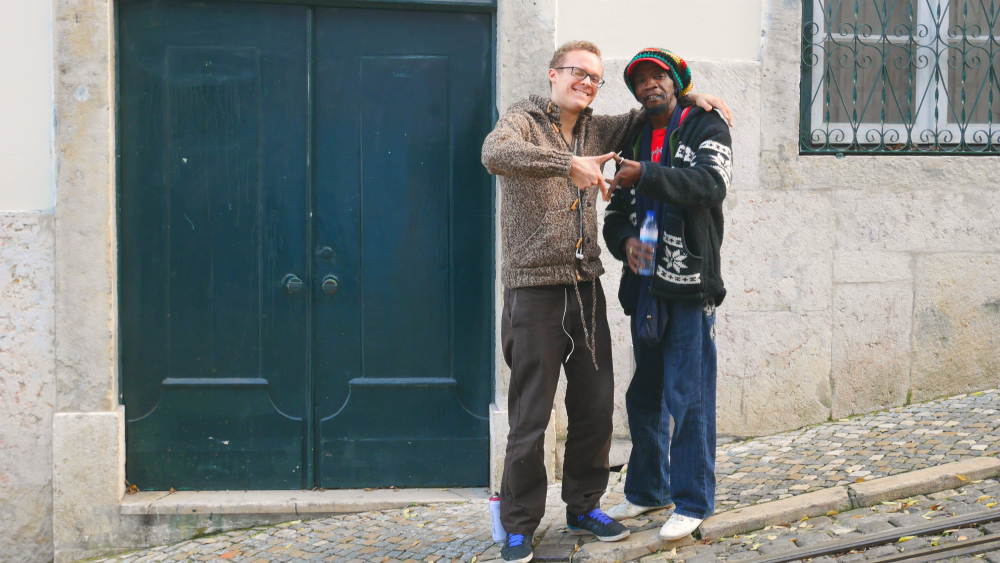
More magic of travel — random encounters with people whop have no business intersecting in one time and place. Dutchie and African dude posing like the pals they were, shot by a rambling Canadian.
Seeing is Believing
Strolling down Rua de Prata, I stopped for a woman playing a melodica.
She had no eyes. She wasn’t blind; she was born without eyes. Skin over the sockets, and nothing else.
On this day filled with sight-seeing and beauty, this shook me.
I stopped, listened, and contributed. But she filled me with pensiveness as I moved on. I didn’t know it then, but I’d see so much blindness in Portugal. The Portuguese are incredibly kind and helpful to anyone visually impaired. They understand the challenges and darkness these folks live with, and how difficult their infrastructure is to navigate without vision.
It’s where I learned that blindness is a matter of money. Apparently 85% of visual impairment can be resolved with medical intervention, but first you need cold, hard cash.
Portugal is fraught in economic turmoil, but most of the blindness I saw was in people over 35, which coincides with the time their dictatorship fell. I’ve never seen so much blindness so often, not in Mexico or anywhere else I’ve travelled yet. It’s fitting that it was a Portuguese author who wrote the novel of when everyone becomes blind, Blindness. Jose Saramago won the Nobel for Literature for that one.
Seeing the eyeless woman playing her melodica for donations gave me new appreciation for my life and opportunities. How could it not? With that in mind, I continued toward the arch leading into the Praca do Comercio.
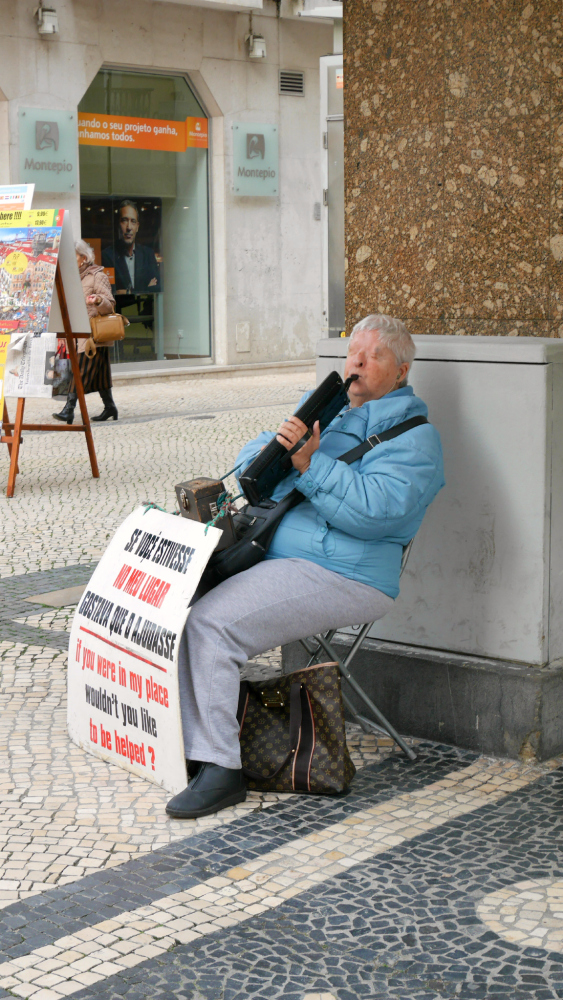
A woman without eyes plays her melodica for passersby. I gave her a couple euros and bade her good day. “If you were in my place, wouldn’t you like to be helped?” Yes… Yes, I would.
History: Unexpected Darkness
Praca do Comercio is the city hub gathering space. People amble and soak in the river’s atmosphere. Today, it’s a large, expansive plaza where you could cram thousands of people for civic festivities.
Z told me it hurt his heart to go there sometimes. See, Guinea-Bissau’s “contribution” to slavery amounted to approximately 24% of American slaves being from “Senegambia,” which Guinea-Bissau was then a part of. Around 100,000 from that small region.
Where did those slaves get sold to their new traders before being sent to America (or other parts of Europe)?
Praca do Comercio. It was, among other things, the slave market for perhaps three centuries. Portugal would rule Guinea Bissau until 1974, around 500 years.
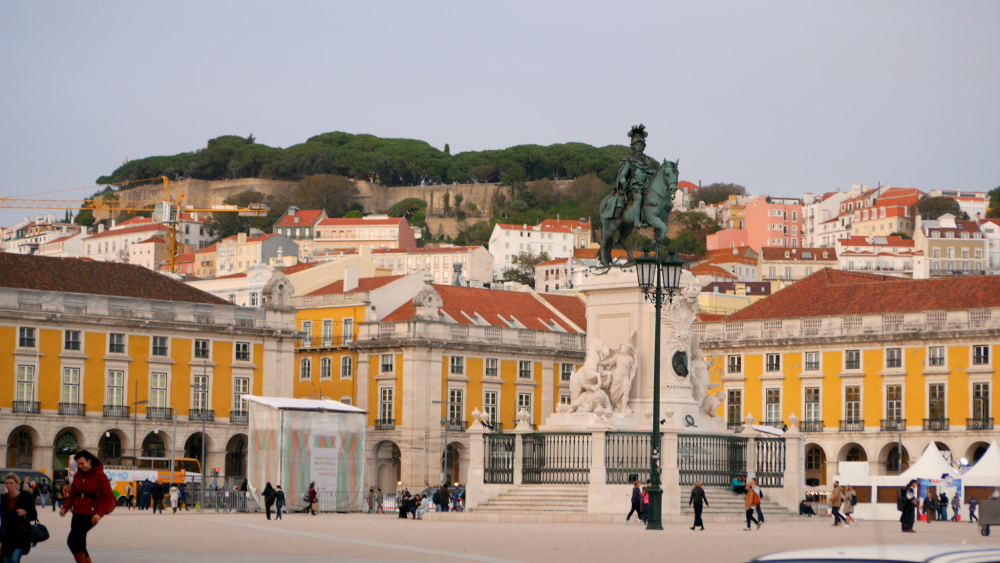
A hub for gathering in Lisbon today, this was once a market of overseas trading. From spices to slaves, they were bought here.
If You Close Your Eyes, You See More
The magic of travel isn’t just about good times with great people, it’s about finding yourself changed by experiences you can’t have at home. If that’s the parameter, then this day was a success. I had fun, but my heart broke too. Whatever the outcome, I knew I’d be changed.
So there I stood, on this former-slave market square, as the sun sank over the river’s confluence at the Atlantic and the world fell under a golden tangerine sky. I processed what this place was versus what it had been. On that very spot, the beginning of the end began for tens of thousands of slaves.
I couldn’t imagine that. Could you? Ripped from your home, standing in this massive civil square as merchants argued over your value as a human. Words and languages you’ve never heard before. In front of buildings you’ve never seen, and lifestyle you never knew existed. While in chains.
I digested that for a few minutes before meandering over to where two guys played guitar. Gratitude overwhelmed me. For my opportunities, for the time in which I’m alive, for how far human rights have progressed… for everything.
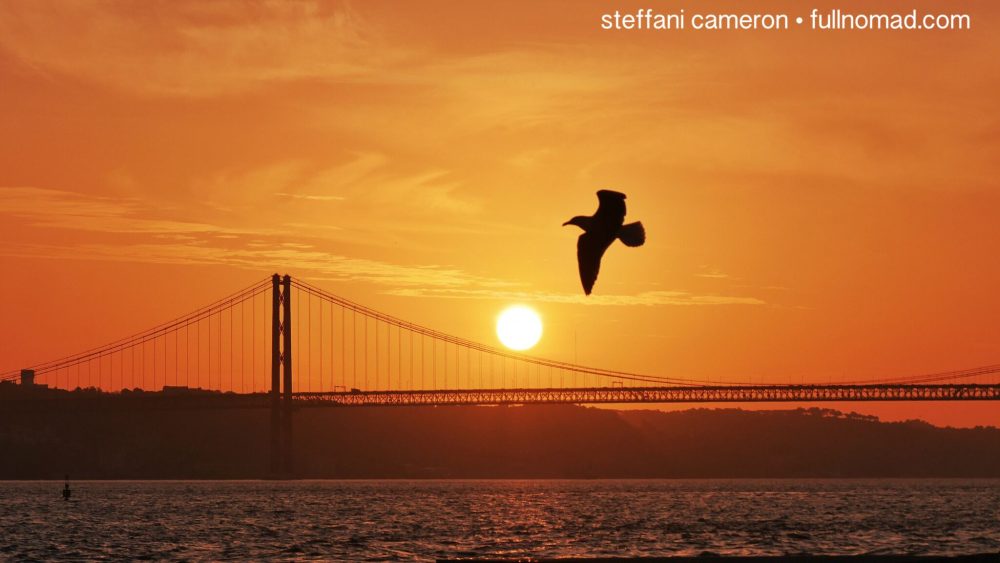
Sunset over the Tagus or Tejo river.
All Good Days End
An hour later, I walked long and slow back to my lodgings. Dinner was found someplace unspectacular, then I happened upon amazing custard tarts. But the magic was during my day. A stroll with no destination ended nearly 9 hours later.
None of my day was planned. But that’s the magic of travel. When your mind is open and your day free, who knows what might come your way.
So that is what I’m in search of. It doesn’t happen a lot, but when it does, travel is gold. Magical. It’s a lifestyle that’s so rewarding in ways you can’t account for or expect.
Where will I be the next time travel magic happens? Let’s find out.

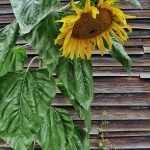
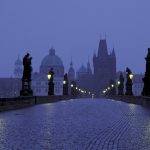
[…] the sun set over the river as two flamenco guitar players played the daylight away. (I wrote at length about this particular day here, which still remains one of the nicest days of my […]